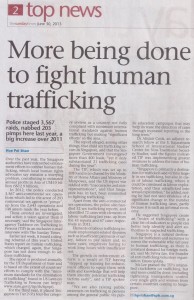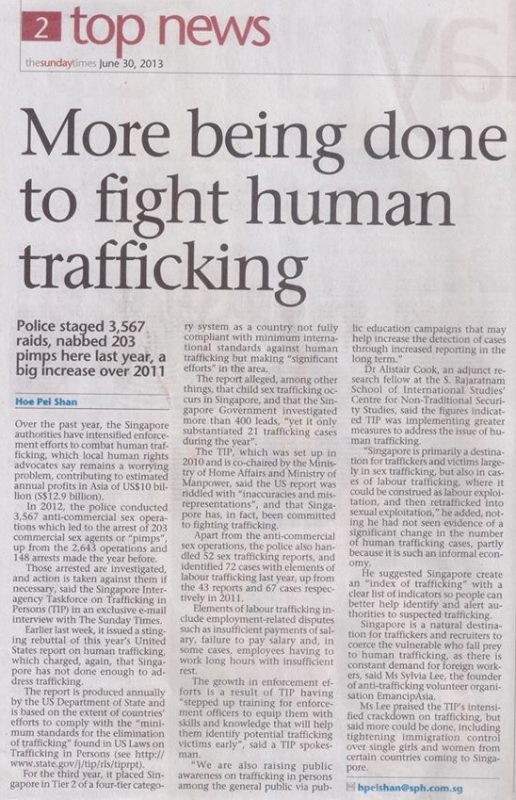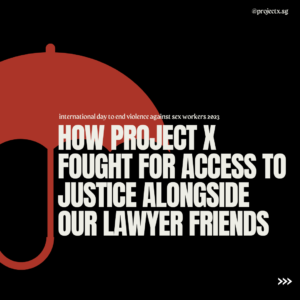I refer to the article “More being done to fight human trafficking” (The Sunday Times, June 30 2013) by Hoe Pei Shan.

I wish to highlight that the way the Inter-Agency Taskforce on Trafficking in Persons (TIP) portrays human trafficking is highly problematic and very misleading.
The writer reports after an interview with the Taskforce that “the police conducted 3,567 anti-commercial sex operations which led to the arrest of 203 commercial sex agents or ‘pimps’, up from the 2,643 operations and 148 arrests made the year before”. The article champions this as efforts by the government to fight human trafficking. However, this is extremely misleading. Two key issues arise from this misleading article: the conflation of sex work and sex trafficking, and the misrepresentation of the intention of raids.
The Conflation of Sex Work and Sex Trafficking
To summarise the definition of human trafficking provided by the United Nations, it requires the transportation of someone using force, deception, or coercion, for the purposes of exploitation. Pimping in and of itself is not an act of trafficking if the pimp does not use coercive means to enlist the worker, and if the conditions under which she works is not exploitative. There are sex workers in Singapore who come here of their own volition to work as sex workers, and who work under decent conditions. By portraying the arrest of pimps as efforts to fight human trafficking is to conflate sex work and sex trafficking.
The United Nations Special Rapporteur in Trafficking in Persons, especially Women and Children—Joy Ngozi Ezeilo, has highlighted that “There is need to move away from over-sexualizing the discourse on trafficking, which invariably contributes to the common stereotype of victims of trafficking as being women and girls forced into prostitution or other forms of sexual exploitation.” The implications of conflating sex work and sex trafficking have been well documented—the two most pernicious effects are how sex workers are denied the right to self-determination and the right to favourable work conditions, and that it reduces the discourse on trafficking to merely sex trafficking.
Not all sex workers are trafficked; and not all victims of trafficking are in trafficked into the sex trade. The article did not mention the hundreds of domestic workers who have been abused and exploited; the thousands of foreign workers who have had their passports confiscated; and the millions of agent fees that have been collected which potentially becomes a form of debt bondage. These are pressing issues with elements of human trafficking that are in dire need of attention.
Misrepresenting the intention of raids
Anti-commercial sex operations, otherwise known as raids, have mostly been conducted to clamp down on illegal voluntary sex workers. Several ministers have highlighted this fact in various speeches from 2005 to 2013 (Wong Kan Seng, Ho Peng Kee, Masagos Zulkifli). Raids are not being conducted with the primary intention to “rescue” victims of trafficking. To call these raids as efforts to combat human trafficking seems to be an opportunistic move by the government to prove that the US Department of State’s TIP Report to be untrue. While I find the TIP Report very problematic as well, fact is, raids have been going on even before the Inter-agency Taskforce was established. These raids were never intended to find victims; rather, they were to criminalize “immoral” women who come to Singapore’s shores to earn a living. This statement by the Singapore government seems also to pander towards the general public’s sentiments of being against prostitution. It’s a win-win situation to issue a statement like this: one that masks the true intention behind raids, appeases the public, and proves the US DOS wrong.
More pertinently, the report failed to mention that while police conduct raids for pimps and sex workers, there are pimps, sex workers and brothels that are licensed by the police and they are immune to these raids. The conditions for licensing are not made public and hence we will never understand the conditions under which the women work. We are also not privileged to the information as to how the women gain entry into Singapore, and what their contracts are like: there is a possibility that exploitation exists in these licensed brothels rather than out on the streets. Project X has documented cases from licensed sex workers who tell us that inside the brothel, they work up to twelve hours a day, and are only given one off day per week. When they fall sick, they have to compensate their bosses for not coming in to work (between $50 to $60 per day); when they meet bad customers who demand for unsafe sex, they are told to keep quiet and get on with it. These are exploitative conditions and they need to be addressed.
Raids are Counter Productive
If anyone has witnessed a raid before, or have spoken to survivors of raids, one would know that it is an operation that is extremely violent and disorientating. Officers are generally armed with batons, tasers, sticks and even guns, against a group of people that will be unarmed, or even undressed. Reports that police use verbal and physical violence during raids have been well documented by Project X (forthcoming report, August 2013). Even if these raids were genuinely conducted to “rescue” potential victims of trafficking, they will probably succeed only in re-traumatising the victims, and allowing them to distrust the law enforcers. As the government champions raids as a way to combat sex trafficking, one should ask: how many women from the raids were identified as trafficked? How many were identified through other means apart from raids? Were interviews done to determine that they are victims of trafficking? What were the indicators used? What happens after they have been identified as victim-survivors?
Furthermore, the police do not have a very good record when it comes to assisting victim/survivors of rape. A person who has been trafficked into the sex trade would have suffered from constant sexual assault and rape—and she/he would have developed some form of psychological effect such as Post Traumatic Stress Disorder or depression. However, the local police have been known to turn away victim/survivors of rape, disbelieve their accounts, or simply tell them that they deserve it and to not waste their time. In particular, sex workers who report cases of sexual assault against them have been constantly rejected. Similarly, domestic workers who report cases of sexual have also been turned away. How can we expect the police to treat victims of trafficking any differently?
Identifying victims of trafficking and traffickers requires a rigorous approach with well-trained professionals who understand the laws and its procedures. It requires a policy for witness protection and avenues to claim compensation. It is not about conducting sweeping raids and then retrospectively investigating these “criminals” for trafficking offences. Especially when the fact remains that most of the migrant sex workers are deported within three to four days of the raid, which includes a period of detention at the cold rooms in the Immigrations and Checkpoints Authority’s building.
Conclusion and Recommendations
“Protection for victims must be delinked from prosecution of traffickers, and protective services and status must be offered without conditionality.” – Alison Brysk, 2012
It is important to be careful to not create new forms of exploitation when fighting to end another. There is a need to put an end to raids—whether it is done with the intention to rescue victims of trafficking or to criminalize voluntary sex workers. They are counterproductive and extremely violent. The report failed to prove that it is an effective way to end human trafficking, and highlighted that the Taskforce should seriously consider adopting a victim-centred approach to the issue.
In addition, Project X believes that a human rights approach is the best approach to combat the issue. Access to health services, support services, labour unions, and legal services needs to be paved. A strong legislation to protect people’s labour rights need to be enacted. And finally, people should not be turned away from the police simply because they are of an illegal immigration status, or that they do not fit the image of an “ideal victim”.
—
Additional Reading
Asia Pacific Network of Sex Workers, Caught Between the Tiger and the Crocodile – The Campaign to Suppress Human Trafficking and Sexual Exploitation in Cambodia
Empower Foundation, 2012, Hit and Run – The Impact of Anti Trafficking Policy and Practice on Sex Worker’s Human Rights in Thailand
Global Alliance Against Traffic in Women, 2007, Collateral Damage – The Impact of Anti-Trafficking Measures on Human Rights around the World
Global Alliance Against Traffic in Women, 2011, Moving Beyond Supply and Demand Catchphrases
Human Rights Watch, 2010, Off the Streets: Arbitrary Detention and Other Abuses against Sex Workers in Cambodia






